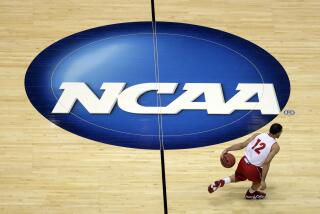NCAA’s New President Is Already a Brand Name
- Share via
Myles Brand, the man who fired legendary Indiana basketball coach Bob Knight, accepted a similarly daunting challenge Thursday when he was named NCAA president-elect and chief executive.
Brand, the 60-year-old president of Indiana University, received a five-year contract. He will replace retiring eight-year NCAA president Cedric Dempsey on Jan. 1.
“I think it’s an important statement to choose a sitting [university] president; it shows intercollegiate athletics are integral to higher education and the two are woven together,” Brand said.
Dr. Robert Lawless, the University of Tulsa president and chairman of the NCAA executive committee that unanimously chose Brand over two other finalists, one of whom was a minority, said “stressing the education component of athletics” was a critical factor in Brand’s favor.
Lawless refused to reveal the identity of the other two finalists and wouldn’t identify the value of Brand’s contract. Dempsey’s contract was worth an estimated $755,000, but the NCAA wanted his replacement to earn less.
“We selected Myles Brand principally because what we were seeking was leadership,” Lawless said.
Brand said his first priority is to listen to all constituencies--chancellors/presidents, athletic department officials, athletes--regarding NCAA-related issues, and to subsequently formulate a strategic process to pursue effective legislation.
Among the issues confronting the NCAA:
* Academic reforms that include calls for an increase in high school core courses and qualifying entrance scores, increased graduation rates and incentives or penalties for team grades.
* Financial aid for athletes in an era when Dempsey has presided over a $6.2-billion basketball television deal with CBS and ESPN, football and basketball coaches are garnering million-dollar contracts and programs are enjoying multi-million-dollar sponsorship deals.
* Diversity in coaching.
* Athletic budgets. Dempsey said only 30 of 124 Division 1-A universities are generating more revenue than they’re spending.
“One great strength [Brand] will have is that the people who hired him want to make him successful,” Dempsey said. “He will have strong support in pushing his agenda along.”
Dick Schultz, the NCAA executive director from 1988-93, said Brand’s reputation from the Knight scandal at Indiana probably seized the executive committee’s attention.
“As president of the NCAA, the biggest authority you have is in the position itself, to convince people to exact change,” Schultz said. “I’m sure the committee was impressed with his leadership skills, intelligence and ability to get the job done.”
Brand didn’t yield to the intimidating Knight during their immensely public showdown two years ago. Brand first instituted a zero-tolerance policy against Knight in May 2000 after Indiana’s board of trustees conducted an investigation into the behavior of the Hoosiers’ 29-year coach, with 763 wins and three national championships. On September 7, 2000, Knight was accused of grabbing and cursing at an Indiana freshman who had informally greeted him, “Hey, what’s up, Knight?” Three days later, Brand fired Knight for “a persistent and troubling pattern of behavior.”
When Indiana advanced to the Final Four in March, Hoosier Coach Mike Davis carried the game ball into the stands and presented it to Brand.
Brand contended the importance of his past with Knight had minimal impact on his hiring. “There was no discussion of it at all in our final interview, not one question,” he said.
Said Lawless: “The way he handled it showed Myles’ ability to make decisions and build a consensus, but there were many other things in Myles’ past that we considered.”
Randy Farley, associate director of media relations for basketball at Texas Tech, where Knight now coaches, said Knight was “out of town and working,” and unavailable for comment.
*
Staff writer David Wharton contributed to this report.
More to Read
Go beyond the scoreboard
Get the latest on L.A.'s teams in the daily Sports Report newsletter.
You may occasionally receive promotional content from the Los Angeles Times.











